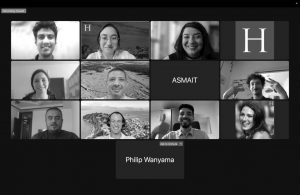Highlights from our Summer School: Digital Tools for Cultural Heritage Management
In May and June 2023, HERITΛGE’s Online Summer School on Digital Tools for Cultural Heritage Management brought together 14 heritage managers from Africa, Asia, and Europe. Led by Dr. Cornelis Stal, this annual immersive program aims to equip participants with advanced skills in GIS, Photogrammetry and image-based 3D modeling, and laser scanning.
Let’s delve into the key highlights and the impact of this transformative experience.
GIS: Unlocking the Power of Spatial Data in Heritage Management
Geographic Information Systems (GIS) play a crucial role in cultural heritage management. During the summer school, participants were introduced to open-source GIS software and gained insights into transforming manuscript plans into comprehensive geographical databases. The importance of cartography in heritage preservation was emphasized. Through hands-on instruction, participants learned practical techniques and implemented them in real-life scenarios, enabling them to harness the power of GIS for effective cultural heritage management.
Photogrammetry and Image-based 3D Modeling: Capturing Heritage in Three Dimensions
Photogrammetry and image-based 3D modeling provide an immersive and detailed way to document and preserve cultural heritage. Participants in the summer school familiarized themselves with various digital tools, such as photography, photogrammetry, 3D modeling, and model referencing. From image acquisition to data processing and model publishing, the entire workflow was covered. Participants were provided with a free license for Agisoft Metashape Professional, allowing them to create their own 3D models. This hands-on experience equipped them with the skills to capture heritage sites in stunning detail and share them with the world.
Terrestrial Laser Scanning: Unveiling the Secrets of Ancient Sites
Terrestrial laser scanning is a cutting-edge technique for acquiring precise and detailed point clouds of archaeological sites. In this specialist course, participants learned the principles and best practices of laser scanning. With a focus on 3D recording for conservation purposes, heritage managers gained the ability to create accurate representations of historic locations. This technology has the potential to revolutionize how heritage sites are documented and preserved, ensuring their legacy for future generations.
Case Studies: Putting Skills into Action
To apply their newly acquired skills, participants selected their own projects as case studies. This personalized approach allowed them to address specific challenges and gain practical experience. Projects ranged from the Roman Theatre at Palmyra in Syria to the Fort Jesus Heritage Site in Mombasa, Kenya. Each participant had the opportunity to work on their project using the digital tools and techniques they learned, making the summer school experience directly relevant to their work.
The success of our Digital Tools Summer School, that takes place annually online and in person, owes much to the expertise of Dr. Cornelis Stal, Lecturer at the Ghent University College (Department of Real Estate and Land Surveying), and Visiting Professor at the Ghent University (Department of Geography) with a significant experience in the field.
This year’s graduates are already putting their newfound expertise into action, ensuring the preservation of iconic sites for future generations.
HERITΛGE is already receiving applications for next year’s summer school and is still accepting applications for its Certificate in Digital Tools for Cultural Heritage Management, let by Dr. Stal and run in cooperation with HOGENT University.

